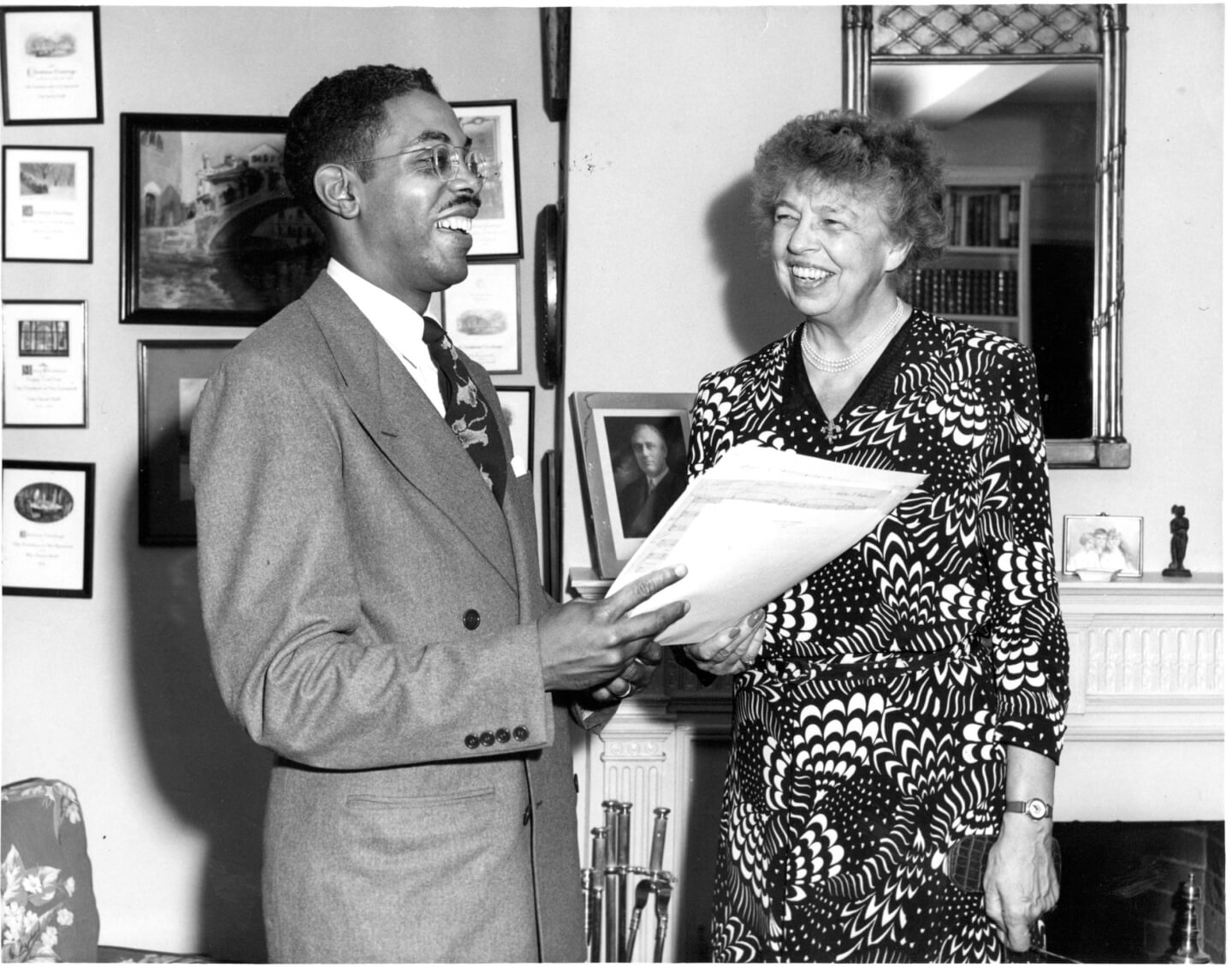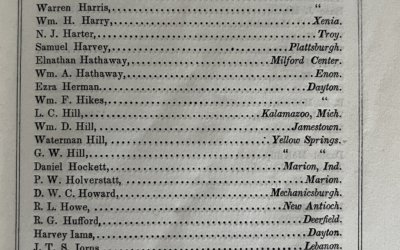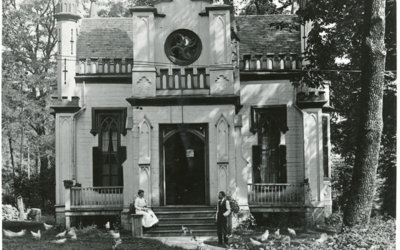Walter Franklin Anderson (1915-2003), known affectionately as “Andy,” joined the Antioch College faculty in 1946. His appointment came with some fanfare as he was the first African American professor in its then nearly 100 year history.
A scholar of music, Anderson attended the prestigious Oberlin Conservatory where he trained on piano and organ, and also studied privately with among other notables the prolific German composer Paul Hindemith. He’d taught previously at Wilberforce, Kentucky State, and Western Reserve (which merged with the Case School in 1967), and had been for several years the Director of Music at Karamu House in Cleveland, a classic neighborhood settlement house that boasts the oldest African American theater in the United States. He was held in such high regard by the Antioch community that the Alumni Association named an annual award for advancing diversity in his honor.

Walter Anderson with Eleanor Roosevelt.
Here Anderson addresses his faculty colleagues during the second session of a 2 day meeting of the faculty in Fall 1968. Held on a Saturday morning, the only agenda item that day was the student-led Afro American Studies Institute, which sought status as a separate institution under the Antioch umbrella, something the College was already doing as it expanded into a multicampus system known as “the Network.” In 1968, one of the most traumatic years of the 20th century, advocacy of separation of the races had gained new currency in the wake of the murders of Dr. Martin Luther King, Jr. in April and Senator Robert Kennedy in June. Such ideas were not new; the physician/soldier/abolitionist/educator Martin Delany had articulated them as early as 1852 in The Condition, Elevation, Emigration, and Destiny of the Colored People of the United States, Politically Considered, but must have seemed outmoded to many who felt that too much progress in race relations had been made (especially since World War II) to turn back now. Many young people, however, didn’t see it that way in light of the violent backlash directed toward African Americans in their own experience.
The Black separatism of the late 1960s surely challenged the thinking of committed integrationists like Walter Anderson. According to the minutes of the meeting, he had written the following statement just hours before. While the document speaks to the issues at hand, more than anything it highlights his compassion and sincerity, two qualities never in question to anyone who knew Andy. To learn more about this remarkable man, pick up a copy of Playing On All The Keys, a lovingly compiled biography by Joan Hergesheimer Horn, class of 1956, available in the Antioch College Bookstore.
APPENDIX B
(Faculty Meeting of October 5, 1968)
STATEMENT BY WALTER ANDERSON, Professor of Music
In the dark of early morn I found myself wrestling with feelings and thoughts conjured up from recollections of our meeting yesterday, along with anticipation of today’s session. I don’t believe that I have been able to express myself satisfactorily; however, in light of the trend of our discussions this morning I feel inclined to risk reading what I have put down with the hope that I possibly may be understood in what I am attempting to say.
I once was called a Caucasian. The occasion was some four or five years ago when I was having lunch in our Antioch Inn with Shanta Rao, the famous dancer from South India. She revealed certain observations which she had made during her visit to the United States. For one thing, she felt that her native style of dancing was much more limpid and more graceful than Western ballet. She said, “Just look at all those big, chunky muscles your women dancers develop in their legs.” But instead I looked at hers and quickly recognized that she had a point. She went on to explain that extensive massaging, which was a regular part of her routine, accounted for the supple and restrained appearance of her whole body. Now I imagined this massaging as being one of the more comfortable parts of that routine until she explained that it was accomplished by having a two-hundred-pound man walk over her for four hours every day. Then, as she lit into her vegetables and fruit while I finished my hamburger, she said, “You know, we Indians aren’t the meat eaters that you Caucasians are,” whereon I replied, “You’re right; we Caucasians are quite cannibalistic.”
I think this incident serves to illustrate how under even the most congenial circumstances we may not altogether hear one another in conversation. If I observed anything at all last year, as in Geneva, Switzerland, I read the Antioch Record some five or six weeks after it was issued, nobody back home at Antioch seemed to be listening to anybody else. Especially did this seem to be true with regard to the all-encompassing concerns being expressed on the Vietnam War, the quest for greater participation of students in the decisions of the institution, and the current racial revolution.
As an integrationist, I first reacted, as a matter of private reflection on the demands of the Black Students Forum for the establishment of a black inner college, with shock and even with dismay as I perceived its threat to my position and my efforts at Antioch for some twenty-two years. I thought to myself, “We almost had it made, and now we resort to our own form of apartheid.” But on further reflection, and this I take to be much more significant, I recognized that apartheid as imposed by the established order, as in South Africa, for example, is a very different institution from the honest quest for identity and self-respect on the part of an individual or a group of similarly concerned individuals in the matter of the recognition of their cultural heritage both for themselves and for others. And so I have come to a position in which I would vigorously support the opportunity sought by the Forum. Essentially we are confronted by the phenomenon of a large, vocal, active group asserting the right for individual considerations, which, except for the social revolution at hand, more likely would have come to our attention on an individual basis. Concomitantly, the faculty and administration are placed in the rather unusual position of having to legislate on certain aspects of a revolution when normally revolutions cannot be legislated.
However what I have to state here in the matter of approval of a single project would stand for nought except as indeed I clarify my wider views on the racial problem of our country and the responsibility I feel any institution of higher education should assume as an essential, worthy goal in the present time. This significantly is related to method.
The Antioch which vibrated for me was motivated essentially by an authority which resulted more from individual concern in action than from talk. The miracle of the institution, as I knew it at its best, could be seen in a variety of positions aimed toward a common goal. Our mores—those tacit, voluntary agreements by which we lived—were supported by a wonderful mix of ethical views, both atheist and theistic, which to a large extent were communicated and identified through strong individual faculty participation in the community. We seemed to extract our community processes more directly from our experiences than from endless, prior verbalizing, which at the present time, in my opinion, has yielded a constellation of successive hang-ups.
With respect to our racial problem, I think that we would have a more immediate and greater yield of positive results if a variety of programs concerned with racial justice were under way. I suppose that few, if any, of us would complain if we could experience the positive results of different programs which had been permitted to develop in their separate ways. I have some concerns, on which I do not pretend to have great wisdom, with reference to two questions which I shall indicate without comment: (1) I wonder a bit about education which for some may proceed in alienation from the larger community both within and outside the institution. (2) I wonder at the possible paralytic effect which might result if the response on the part of the major community is induced from a posture of guilt or fear.
As an integrationist, I personally want to serve the needs of the separatists because at least they have had the guts to get their program going. (Here I have a semantic problem; for every time I say they, I also want to say we. Put together, the words become thwee, which sounds as though I can’t speak plainly. But the combination of them and us comes out better for the word, thus, clearly implies action following reasoned consideration.)
I should like to see quality established as rapidly as possible, not at the lower, but at the upper levels. But given ten men, of whom one is without legs. I do not believe that anything is being equalized if the legs of the other nine are cut off. Accordingly, I don’t identify with violence or threats. For example, I’d have much preferred being confronted by demands from the Black Students Forum which read, “We believe, and are convinced, that this institution will function better if our demands are met” rather than to threaten that “these demands must be met or this institution will not function.”
We face difficult times and difficult tasks. The problem at present appears to be more emotional than educational. Ultimately what we do now may prove to be eminently more important than anything we say or any name by which we may be addressed. There is a question in my mind concerning whether excesses undertaken in the effort to establish a new morality may in themselves create a new immorality. I think that all of us might undergird our well-intentioned feelings with the value understood in the realization that corruption need not be dealt with corruptly.
I was taught love, and my religion expects love of me. Moreover my life experiences confirm for me that through love, patience and hard, intelligent effort we can win as a total body of human beings.
“Songs From the Stacks” is a regular selection from Antiochiana: the Antioch College archives by College Archivist Scott Sanders.



